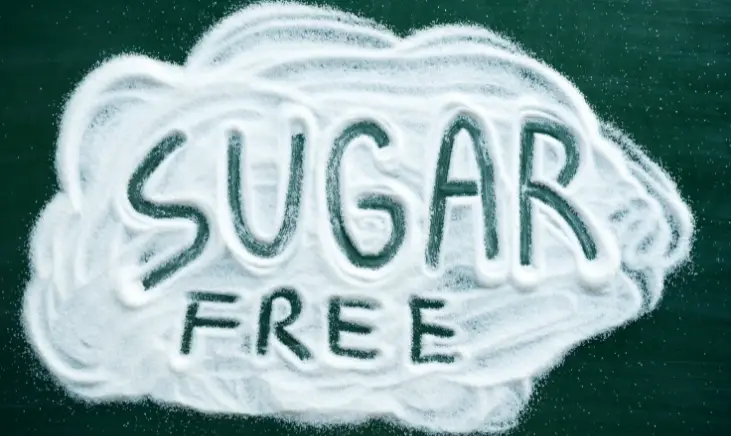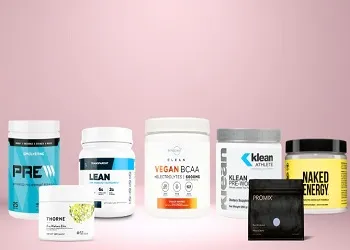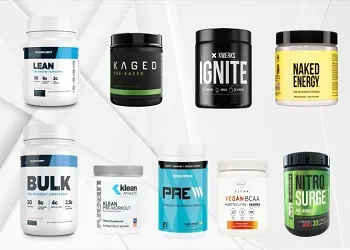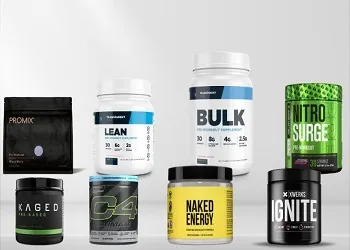If you take a look at the nutrition facts label on most bottled beverages, you will find that many contain 20, 30, 40, or even 50 grams of added sugar. To put this into context, that is way over the limit.
Experts recommend that men should consume less than 36 grams of added sugar daily, and women should consume less than 25 grams.
This means that just 16 ounces of many sweetened beverages puts you at or above the science-backed guidelines.
While you may immediately think of Coca-Cola, Pepsi, and other sugary drinks, electrolyte-rich sports drinks are no different, with many containing 30-50 grams of added sugar per 16 ounces. In fact, if you read the sports drink ingredients on their bottles, sugar is the second ingredient after water. Many also come in bottles that are closer to 30 ounces, so one bottle can really pack extra sugar into your diet. This sugar is purposeful if you are drinking these beverages while training or competing. However, if you are not, they can be just another contributor to excess sugar in your diet.
The good news is that you can still get the dose of electrolytes you are looking for without the excess sugar. Lower sugar and sugar-free electrolyte drink alternatives are widely available. In this article, we will break these options down for you so you can make the best choice for you and your health.
Table of Contents
Short Summary
- Electrolytes play a key role in maintaining hydration levels within our bodies.
- While many commercially available sports drinks contain both sugar and electrolytes, the sugar is not needed for hydration.
- Lower sugar and sugar-free electrolyte drinks provide better options for regular day-to-day use when not exercising intensely enough to need the sugar found in traditional sports beverages.
- Reduced sugar alternatives vary in the type of sweetener and levels of calories, carbohydrates, and sugar. Knowing these facts can help you pick the best electrolyte beverage for you.
What Are Electrolytes?
Electrolytes are minerals that have an electric charge and play various important roles within our bodies. These minerals include:
- Sodium
- Potassium
- Phosphorus
- Calcium
- Chloride
- Magnesium
Electrolyte minerals vital functions include fluid and pH balance, as well as muscle contraction.
Why Are Electrolytes Essential for Hydration?
Electrolytes ensure fluid balance within our bodies. Certain essential electrolytes are found in higher concentrations within our cells, while others are found in higher concentrations outside of our cells. This distribution of electrolytes, along with their electric charge, helps move fluid in and out of our cells to maintain our electrolyte levels and keep our body hydrated.
Do You Need Sugar for Hydration?
While many electrolyte beverages contain added sugar, it is not key for hydration. The function of sugar in these beverages is to provide energy to working muscles, which helps prolong performance during physical activity.
For hydration purposes alone, the fluid and electrolytes in these beverages are much more important than the sugar.
Why You Should Opt for Electrolyte Drinks Without Sugar
High sugar electrolyte drinks serve a clear purpose, which, as we just mentioned, is to provide energy to working muscles. These carbohydrate-rich beverages are most useful to athletes engaging in prolonged training and competitions. For example, a marathon runner can sip a carbohydrate and electrolyte-rich beverage throughout their race to provide their body with a continuous supply of energy and sustain their best performance over a long period of time.
While there is a time and a place for sweetened electrolyte drinks, these beverages have gained popularity and are consumed much more often than during athletic events. There are benefits of drinking electrolytes outside of exercise, however. When this is the case, the added sugar is not necessary.
To put it simply, if you are training hard and your goal is to fuel prolonged exercise, opt for a sports drink with sugar. If you are drinking electrolytes for any other purpose, a typical sports drink likely has too much sugar, so opt for a beverage with little to no sugar instead. If you’re unsure how to choose, we’re here to help.
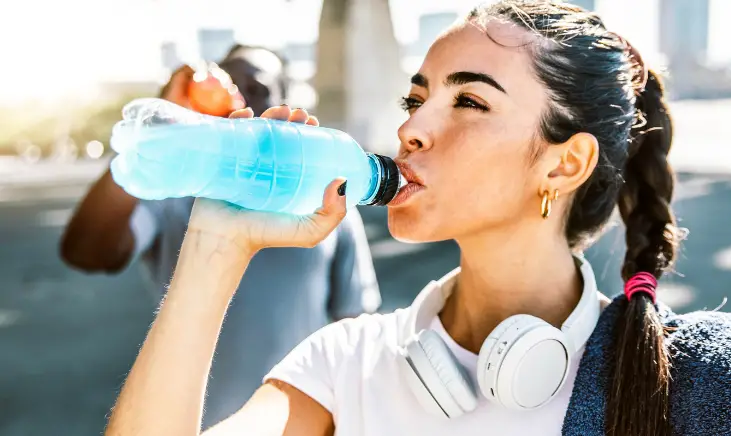
Sugar-Free Electrolyte Drinks
Many sports drinks and electrolyte products come in sugar-free varieties for times that the added sugar isn’t necessary. These are the lowest calories, carbohydrate, and sugar alternatives.
Gatorade Zero
Gatorade Zero is a sugar-free alternative to traditional Gatorade. This alternative is sweetened with sucralose, also known as Splenda, so it still has a sweet taste, but it contains 0 calories, 0 grams of sugar, and < 1 gram of carbohydrate.
Powerade Zero
Similar to Gatorade Zero, Powerade Zero is another sugar-free electrolyte drink that is sweetened with sucralose instead of sugar. This alternative also contains 0 calories, 0 grams of sugar, and 0 grams of carbohydrate.
Propel Electrolyte Water
Propel Electrolyte Water, made by Gatorade, is another 0 calorie, 0 carbohydrate, 0 sugar electrolyte alternative that is sweetened with sucralose.
Ultima Replenisher
Ultima is a zero sugar, powdered electrolyte drink mix. Similar to the other options discussed, it contains no calories, carbohydrates, or sugar. However, this option is sweetened with stevia instead of sucralose, which is a more natural calorie-free sweetener.
LMNT Electrolyte Drink Mix
LMNT is another powdered electrolyte mix that is sweetened with stevia and free from calories, carbohydrates, and sugar.
Liquid IV Sugar-Free Hydration Multiplier
Liquid IV makes a sugar-free variation of their classic low sugar electrolyte powder. The sugar-free option is sweetened with a combination of stevia and allulose, which is a sweetener found in some fruits.
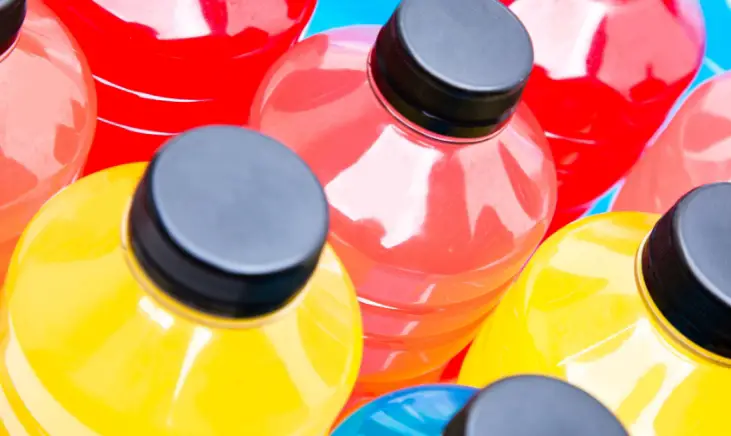
Lower Sugar Electrolyte Drinks
Another option is to choose an electrolyte beverage or product without large amounts of added sugars. While these products do contain some sugar, these liquids, powders, and electrolyte tablets contain much less than traditional electrolyte drinks and can help keep your sugar intake low.
A quick note here—some experts recommend it is best to avoid artificial sweeteners, including sucralose, which is found in many of these beverages. We’ve included the type of sweetener for each of these options so you can make an informed decision for yourself.
Gatorade G2
Gatorade’s G2 variety contains half the sugar of traditional Gatorade, with the same electrolyte content. This option contains a mix of sugar and sucralose for sweetness.
Gatorade G2 contains 40 calories, 10 grams of carbohydrate, and 9 grams of sugar per 16 ounces.
Gatorade Fit
Gatorade also makes Gatorade Fit, which is watermelon juice-based and contains no added sugar or artificial sweetener. However, it does contain stevia, a natural sweetener, for additional sweetness.
Gatorade Fit contains 15 calories, 3 grams of carbohydrate, and 1 gram of sugar per 16 ounces.
Bodyarmor Lyte
Bodyarmor Lyte is a low calorie electrolyte beverage with no added sugars. It is also sweetened with stevia and contains no artificial sweeteners.
Bodyarmor Lyte contains 15 calories, 14 grams of carbohydrate, and 2 grams of sugar per 16 ounces.
Nuun Hydration
Nuun Hydration’s electrolyte tablets are another low sugar electrolyte option that is sweetened with stevia.
Nuun contains 15 calories, 4 grams of carbohydrate, and 1 gram of sugar per tablet, which makes one 16 ounce beverage.
Liquid IV Hydration Multiplier
Liquid IV is a lower sugar option that comes in packets of electrolyte powder. Liquid IV is sweetened with a combination of sugar and stevia.
Liquid IV contains 45 calories, 11 grams of carbohydrate, and 11 grams of sugar per packet, which makes one 16 ounce beverage.
Coconut Water
If you are looking for a more natural alternative, coconut water is a naturally occurring electrolyte drink. In its natural state, coconut water does not contain any added sugars. However, some bottled coconut waters do contain added sugar, so be sure to read the nutrition facts label and look for the line that reads “0 grams added sugar.”
Coconut water contains 90 calories, 18 grams of carbohydrate, and 12 grams of sugar per 16 ounces.
The Best DIY Electrolyte Drink Without Added Sugar
Another more natural, low sugar option is to make your own electrolyte drink. The most simple way to do so is to combine water and/or coconut water with fruit juice and a pinch of salt. You can adjust the amount of fruit juice you add to your taste and sweetness preference and truly customize your own beverage.

Electrolyte Drinks Without Sugar: The Bottom Line
Traditional, commercially available sports drinks intentionally contain large amounts of sugar. If you are an athlete or otherwise active individual who is competing, training, or exercising strenuously, this sugar can be the added fuel your muscles need to sustain a high level of performance. However, if you are drinking electrolytes outside of exercise, your body likely does not need the added sugars. Low or no sugar options provide a great alternative at these times.
How to Choose an Electrolyte Drink
As a dietitian, I like to recommend choosing a sports drink over plain water when physical activity meets the 3 H criteria. This involves hard, intense exercise for an hour or more in a hot and/or humid climate. These workouts often result in large quantities of sweat and lost electrolytes and call for increased fluid intake and a rehydration supplement. These same criteria can be used to discern if you need a carbohydrate-rich sports drink or a low or no sugar alternative.
Using the information above, you can evaluate popular electrolyte drinks on their sugar content, calorie and carbohydrate levels, and type of sweetener to determine the best electrolyte drink for you.

Summary
Added sugars are in a lot of drinks that many people consume on a regular basis. Sports drinks are no exception. However, lower sugar sports drinks and sugar-free options provide alternatives that can fit better into many people’s diets to cut back on added sugars, while still providing beneficial electrolytes.
FAQ
Is there an electrolyte drink without sugar?
Yes, many traditional electrolyte drinks come in sugar-free variations. Additionally, some specifically sugar-free electrolyte products exist. A few of these options include:
- Gatorade Zero
- Powerade Zero
- Propel Electrolyte Water
- Ultima Replenisher
- LMNT Electrolyte Drink Mix
- Liquid IV Sugar-Free Hydration Multiplier
How do you make your own electrolyte water?
Combine water and/or coconut water with fruit juice and a pinch of salt to make your own electrolyte drink. You can adjust the proportions of these ingredients to suit your electrolyte needs, as well as your taste and sweetness preferences.
What is the easiest way to replenish electrolytes?
Electrolyte beverages are an easy way to quickly and efficiently replenish electrolytes when needed.
For general maintenance of electrolyte balance, be sure to eat electrolyte-rich foods daily. At baseline, this is usually sufficient to meet your electrolyte needs. However, if you have lost electrolytes from sweating during strenuous exercise, vomiting and/or diarrhea with an illness, or another cause, replenishing with an electrolyte-rich beverage can help to restore both electrolyte and fluid balance within your body.
What is the most natural electrolyte?
When it comes to beverages, coconut water is a great natural electrolyte option. It is much lower in sugar than many traditional sports drinks and does not contain any added sugar or artificial sweeteners.
Electrolytes are also naturally found in many foods. Eating a balanced diet will help ensure you get the electrolytes you need and maintain adequate levels regularly. Some of the best food sources of key electrolytes include:
- Bananas
- Avocados
- Tomatoes
- Potatoes
- Leafy greens
- Nuts
- Seeds
- Beans
- Soy
- Meat
- Fish
- Dairy
Can a Diabetic Drink Gatorade? Can Diabetics Drink Electrolyte Drinks?
If you have diabetes, you can consume Gatorade as you would consume other sugar sweetened beverages, but it should be done in moderation with consideration for how it impacts your blood sugar levels.
If you consume these sweetened beverages regularly, a sugar-free or lower sugar alternative would likely be a better option for your blood sugar control and overall health.
As with anything concerning diabetes or any other chronic diseases, discussing with your doctor or registered dietitian will help you develop the most personalized plan for you.
